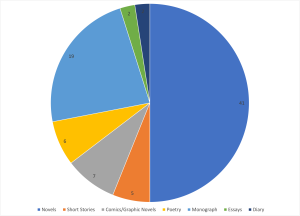Song: “KYBM” by Tunde Olaniran
A producer/rapper/singer from Flint, Michigan, of all places, Tunde Olaniran is pulling together all kinds of different sounds on his debut album, which is one of the most interesting things I’ve heard this year. This track is fairly representative, to the extent that any one song could be.
Article: “At the Mercy of the Water Mafia” by Aman Sethi
In the last couple of decades, global economic growth has led to dramatic increases in wealth in countries that were very, very poor a few decades agao— Brazil, India, Nigeria, etc.— a populations in those countries have shifted, following jobs and opportunities. One result of this has been the massive growth of urban centers like Lagos, Nairobi, and Delhi. That’s all to be expected, and in many ways it’s good: it aggregates talent and labor, making the more available to those who have capital, while it reduces the problems of delivering services to rural areas in developing countries— and cities are, in principle at least, more environmentally sustainable. But there are obvious problems associated with rapid population growth as well, particularly when it hasn’t been planned for. This is why you get, for instance, massive slums built out on the water in Lagos, in which people live in terrible and unsafe conditions.
In particular, rapid urban growth puts pressure on infrastructure, like roads, electricity grids, and, here, water. Delhi gets most of its water supply from aquifers, and with no infrastructure in place for most residents of the city (i.e., no pipes to their homes, especially semi-legal slums), the process of drawing water from wells and boreholes and trucking it to the people who need it has, predictably, created opportunities for exploitation and corruption. It actually seems like a misnomer to call the truckers described here a “mafia,” first because Sethi doesn’t describe much violence associated with what they are doing and, second, because it’s more like a “gray market,” a basically legal activity done outside of government regulation and supervision. In any case, this is the flip side of laissez-faire economics: where the government doesn’t act, the market will, but not always in ways that are just, fair, or desirable.
Article: “Corn Wars” by Ted Genoways
Concerns about genetically modified crops, factory farming, chemical fertilizers and pesticides, etc. have lately drawn more and more public attention to methods of food production. We don’t hear as much, though, about the national security and foreign policy aspects of food. Genoways uses an alleged case of Chinese government-sponsored industrial espionage to highlight the fact that increased crop yields aren’t just a matter of economic concern for farmers and seed companies, but also affect global political stability.
As the global population continues to climb and climate change makes arable soil and water for irrigation ever more scarce, the world’s next superpower will be determined not just by which country has the most military might but also, and more importantly, by its mastery of the technology required to produce large quantities of food.
This isn’t new at all; as Genoways makes clear, policymakers have long seen food as a potential tool for achieving national interests, and during the Cold War food production played a role in the policy, and propaganda, of both sides. That has influenced changes in production, including increased use of pesticides, hybrid crops, and genetic modification.
Foreshadowing today’s aggressive, pro-corporate agricultural policies, [Secretary of Agriculture Ezra Taft] Benson argued that the only way to outcompete the collective farms of the Soviet Union and Red China was to use our superior corn and chemical technology to the fullest. The United States could, if it chose, overproduce corn to drive down international prices, and it could use the surplus as a tool of diplomatic leverage in the form of foreign aid. Instead of guns, the United States began to give our allies grain—transforming, for the first time, a food product into a weapon in the national arsenal. The only problem was that by effectively militarizing American agriculture, Benson made agri-tech a target for foreign spying.
There’s a lot in this piece, including some amusing stories about the alleged Chinese spies’ attempts to smuggle seeds out of the country. Mostly, though, it’s a new angle on an issue many of us are thinking about already.
Article: “The Virtues of Difficult Fiction” by Joanna Scott
I’ll start this one with a quotation:
The national educational standards known as Common Core mandate more “informational” reading, necessarily reducing the amount of fiction read in the classroom. By the 12th grade, 70 percent of a student’s reading is supposed to be nonfiction. As a public-school administrator recently explained, “We look at teaching literature as teaching particular concepts and skills. So we maybe aren’t teaching an entire novel, but we’re ensuring that we’re teaching the concepts that that novel would have gotten across.”
If that doesn’t kind of make you sick to your stomach, you and I are very different people. (It might also make you think of Gary Shteyngart’s Super Sad True Love Story, in which a younger character describes being taught to “scan texts for information” rather than to do sustained, focused reading. To the extent that our society lives up to the predictions of that book, we are clearly on the wrong track).
The larger point that Scott is making here is that reading hard things is, in itself, a useful and rewarding thing to do. In a way, the case for this seems so obvious to me that it shouldn’t need to be made, but apparently I’m wrong. If you’d like a reminder, though, or just some more ammunition for your own arguments, this piece will provide it.
Article: “Going Pink: The Suicide Girls Story” by Julia Rubin
When I was taking feminist theory in college, we were kind of at the tail end of the popularity/topicality of a set of ideas about the way that female sexuality could or could not be deliberately used to achieve individual goals. Maybe the most famous formulation of these ideas was Camille Paglia’s, in which she argued that, for instance, strip clubs were an instance of goddess worship that could be connected back to temples of Astarte and ritual prostitution in the ancient Middle East. That one, in particular, was hard for a lot of people to swallow, but in general the idea was that if female sexuality was something for which there was a ready market, there is no reason in principle that women cannot control that market, consciously using their sexuality for economic, cultural, or political advantage without necessarily being exploited or controlled. A more recent version of this notion is Catherine Hakim’s idea of “erotic capital” (or “honey money”).
At about the same time as I was taking classes in which these ideas were discussed, the website Suicide Girls was being founded as, ostensibly, a different kind of porn site (they want to call it erotica, not porn, but frankly I’m not sure that distinction has any value beyond marketing). Run by a woman, the site requires all of its models to maintain a blog with regular entries, to encourage a perception of them as individual persons; models are in control of their shoots, dictating not only the ideas or themes behind them but also ground rules for what they will or won’t do. Funded through subscriptions alone, with no advertising, the site has managed to survive for almost 15 years, not only turning a profit but, recently, expanding into the production of a live, touring burlesque show.
Rubin’s piece isn’t particularly critical, glossing lightly over some of the controversies around the site. Personally, I’m not quite sold on the idea that the steps that the site has taken sufficiently mitigate all of the problems with this kind of thing in general, but I also think the question of whether that is in fact possible is an interesting one, and Suicide Girls is probably the highest-profile, most successful attempt to move in that direction.


